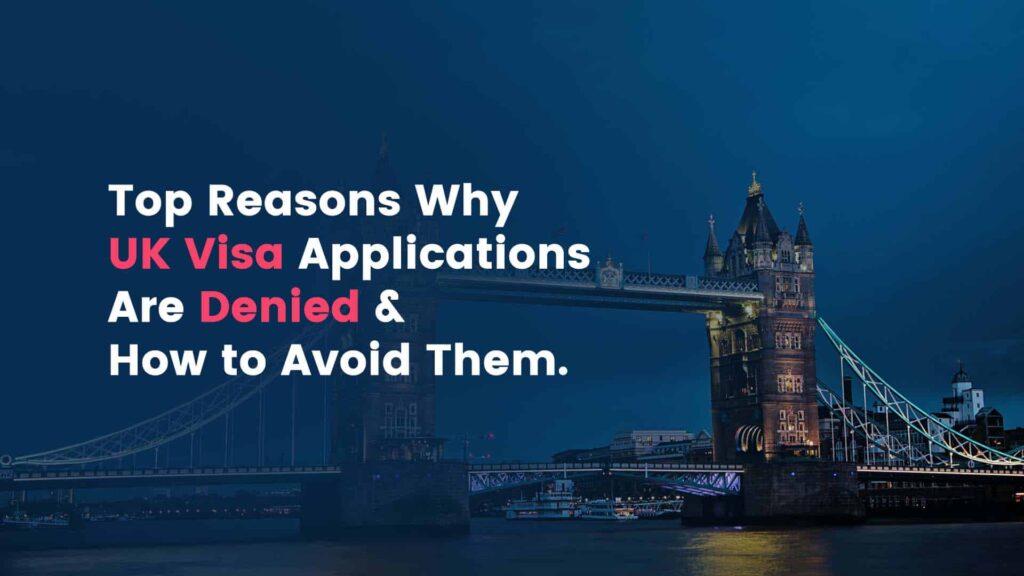Whether it’s for business, research, or pleasure, many people have a dream of visiting the United Kingdom. Yet, getting a UK visa can be difficult and intimidating, especially for individuals who are not familiar with the procedure. Although a visa denial might be upsetting and disheartening, it can also provide important life lessons. Everyone who wants to visit the UK must be aware of the causes of visa denials in order to see potential problems and fix them before submitting their application.
The most frequent causes of UK visa denials will be covered in detail in this blog post, along with helpful advice on how to steer clear of these mistakes. Everything from incomplete or erroneous applications to problems with criminal histories, health conditions, financial standing, and more will be covered. The knowledge provided in this blog will be invaluable in assisting you in navigating the visa application process with ease and confidence, regardless of whether you are planning a brief visit or a lengthy stay in the UK. Let’s get started and learn all there is to know about UK visas!
Common Reasons for UK Visa Denials
There can be several reasons a UK visa may be rejected. Here are the most common reasons why your visa may be rejected:
1. Inconsistent or false information:
Including inaccurate or inconsistent information in an application is one of the most frequent causes of UK visa denials. This may involve typographical or factual inaccuracies in your personal data, trip plans, or supporting documentation. To prevent this, please be sure to verify that all the information you submit is correct and up-to-date. Consult a specialist if you have any questions regarding any component of your application.
2. Insufficient funds:
Insufficient financial resources is another typical reason for rejecting applications for UK visas. In order to obtain a UK visa, you must possess sufficient means to pay for both your travel and living expenses while there. This includes the price of lodging, travel, meals, and other costs. To avoid any problems, make sure to offer clear and thorough documentation of your financial condition, such as bank statements and proof of income.
3. Lack of ties to the home country:
While assessing your application, UK immigration authorities will also take into account your connections to your country of origin. They’ll want to make sure you have a good excuse to go back to your native country after visiting the UK. Family relationships, property ownership, job, and other responsibilities are examples of this. Make sure to present documents, such as employment contracts, property records, or letters from family members, as proof of your connections to your place of origin.
4. Criminal history or security concerns:
Criminal history or security considerations are two additional frequent grounds for UK visa refusal. You might not be granted a UK visa if you have a criminal record or have engaged in any activities that raise security concerns. Be open and truthful about your criminal background, and offer any supporting paperwork that may be required, such as police reports or court records.
5. Health issues:
Denials of UK visas can also be caused by medical concerns. In order to qualify for a UK visa, you must not be a risk to the health or safety of others and not have any conditions that would necessitate expensive or continuing medical care in the country. Make sure you offer thorough documentation of your medical condition, including any required treatment plans and medical records.
6. Previous visa denials or overstays:
Last but not least, prior visa refusals or overstays may also result in UK visa denials. Your current application may be impacted if you have previously had a UK visa denied or if you have overstayed a previous visa. Make careful to include a persuasive justification for any prior visa denials or overstays as well as evidence that you have taken action to resolve any concerns.
Anyone looking to travel to the UK must be aware of the common causes of visa refusal. Avoiding these mistakes and offering thorough documentation to back up your application will boost your chances of being accepted, allowing you to travel to the UK with assurance and peace of mind.
How to Avoid These Issues
Don’t let these reasons hinder your dream of going to the UK. Here are some helpful practical tips and strategies that can help you increase your chances of success:
1. Provide accurate and consistent information:
Make sure to verify all the information you enter and ensure that it is true and current before completing your application to prevent providing inconsistent or false information. Consult a specialist if you have any questions regarding any component of your application.
2. Demonstrate adequate financial support:
Make careful to show that you have sufficient financial support to cover your costs while in the UK to prevent having your visa denied for lack of finances. To prove you have the money to sustain your stay, you should present bank statements, pay stubs, or other financial records.
3. Show strong ties to the home country:
Provide documentation of your ties to your home country, such as work contracts, property records, or letters from family members, to demonstrate your commitment to your nation of origin. Make sure to give a compelling justification for why you will be going back to your native country after visiting the UK.
4. Address any criminal history or security concerns:
Be open and truthful about your criminal background and offer any appropriate paperwork, such as court records or police certifications, to answer any security issues or questions you may have about it. Show that you pose no danger to the security or safety of the general public.
5. Address any health issues and provide necessary medical documentation:
Provide thorough documentation of your medical status, including medical reports and any appropriate treatment plans, to address any health difficulties. Show that you don’t endanger the safety or health of the general population.
6. Explain the circumstances of previous visa denials or overstays:
Include a note in your application if you have ever had a visa denied or if you overstayed a visa in the UK. You must present all required paperwork and evidence that you have taken action to resolve any concerns that resulted in the previous visa being denied or being overstayed.
Conclusion
If you want to visit the United Kingdom, you must apply for a visa, and understanding the frequent causes of visa denials is crucial. Many things can result in a visa being denied, including giving contradictory or misleading information, not having enough money, not having any ties to one’s home country, having a criminal record or security concerns, having health problems, and having had visas previously denied or overstayed.
Takeaways for avoiding visa rejection:
Yet, you can improve your chances of being granted a UK visa by adhering to a few useful methods and ideas. First and foremost, it’s important to provide consistent and correct information, and getting expert counsel might be beneficial. Second, it’s crucial to provide evidence of enough financial support, such as bank statements and proof of income. Lastly, demonstrating your close ties to your own nation with documents like employment contracts, property records, or letters from family members can be beneficial.
Fourth, it’s critical to address any security or criminal past problems, as well as to present thorough documentation of your health status if you have any. Finally, you can improve your chances of success by outlining the specifics of any prior visa refusals or overstays and proving that you have taken action to resolve any concerns.
To avoid the frequent causes of visa denials, it is crucial to approach the UK visa application procedure proactively. By doing this, you’ll improve your chances of success and give yourself the peace of mind and assurance you need to travel to the UK. Keep in mind that preparation is essential, and when necessary, professional counsel can be quite beneficial.
Also, it’s critical to remember that visa officers face a difficult duty every day: assessing hundreds of visa applications. As a result, it is crucial to provide precise and detailed information to make their job as simple as possible. Being truthful and open in your application is crucial because any inconsistencies or misleading information could result in its rejection.
Finally, as processing times can differ, it’s imperative to submit a visa application as soon as you can, especially during busy times. Moreover, make sure you have all the required paperwork, including visa fees and any additional criteria particular to your visa category, before completing your application.
Make UK Visa acceptance easier with VisaGuy:
Obtaining a UK visa might be challenging, but with careful planning and a proactive attitude, you can raise your chances of success. By using the useful advice and techniques covered in this blog article, you can steer clear of the frequent causes of visa denials and have a stress-free and enjoyable trip to the UK. Always remember to complete your application completely, accurately, and honestly. If necessary, you should also obtain professional guidance. Apply early to prevent processing delays. To get your UK visa done smoothly apply with Visa Guy and avoid getting rejected.



